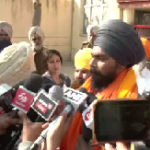Progressive groups that have long advocated for a change in the leadership of the World Bank decried the Biden administration’s nomination of a former Wall Street and corporate executive as more of the same at the anti-poverty lender.
Washington’s selection of former Mastercard Inc. Chief Executive Officer Ajay Banga to be the World Bank’s president was being condemned as a forfeited opportunity to tap a candidate with deep public-sector experience combating economic inequality and climate change
The World Bank needs a leader “who will prioritize the urgency of the climate crisis, not another big business executive,” said Collin Rees, US program co-manager at Oil Change International, a group that pushes a pivot away from fossil fuels. “Banga’s long career at predatory banks and corporations does not inspire confidence that he would transform the World Bank into an institution that can work for people and the planet.”
To be sure, Mr Banga’s selection drew praise from supporters who said the 63-year-old raised in India brings a different perspective to an institution whose leaders typically have been deeply embedded in the US. US Treasury Secretary Janet Yellen on Thursday said Mr Banga’s track record “forging partnerships between the public sector, private sector and nonprofits uniquely equips him to help mobilize the private capital and press for the reforms needed to meet our shared ambitions.”
And John Kerry, the US special presidential envoy for climate, hailed Mr Banga as “the right choice,” casting his corporate experience as an asset. Mr Banga has “proven his ability as a manager of large institutions and understands investment and the mobilization of capital to power the green transition,” he said.
But climate activists and progressive groups said Mr Banga still hews too closely to the typical mold of male World Bank presidents with deep ties to Wall Street and corporate America, including its current head, David Malpass, who previously was a chief economist at Bear Stearns Cos. Mr Banga, now vice chairman at US investment firm General Atlantic LP., has previously worked for Nestle SA, PepsiCo Inc., and Citigroup Inc.
“Nothing in Banga’s resume inspires confidence that he will turn the World Bank away from a path of neocolonialism and predation by Global North corporations upon Global South countries,” said Jeff Hauser, executive director of the Revolving Door Project, a not-for-profit group that fights corporate influence in Washington.
Hauser called on President Joe Biden and Yellen to retract the nomination. Despite an abundance of “highly accomplished figures committed to the public interest,” he said, the administration’s choice seems rooted in an assumption “those who govern best are those who have profited the most from deregulation, economic predation and the shrinking of the public sphere.”
A Treasury spokesperson pointed to support from former financial and government leaders, including former Vice President Al Gore and former Bank of England Governor Mark Carney.
Michael Schlein, the chief executive officer of Accion, a global microfinance and impact investment nonprofit, said Mr Banga “brings a deep knowledge of the challenges – and keen insights into the solutions – to tackle some of the world’s most urgent problems.”
The next World Bank leader will take over at a pivotal time, amid a growing clamor for reform of multilateral development banks and international financial institutions to unlock more climate finance in the developing world. Yellen is pushing the World Bank to evolve from its traditional focus on country-specific lending and shift to broader, global goods, such as fighting climate change.
The departing president, David Malpass, came under fire after appearing to dodge questions on whether he accepted the scientific consensus that climate change is driven by the burning of fossil fuels and the resulting man-made greenhouse gas emissions.
“We don’t need another World Bank president who will further corporate interests like fossil fuels and industrial agriculture,” said Kate DeAngelis, international finance program manager for the environmental group Friends of the Earth.
Traditionally, the US nominates the president of the World Bank; as the institution’s largest shareholder, the country’s voice usually carries the biggest weight. However, some progressives were goading other countries to advance credible challengers for the post.
“The rest of the world’s governments still have the opportunity to step in,” said Bronwen Tucker, co-manager of the public-finance campaign at Oil Change International. “They can and should nominate their own candidates, vote freely and demand a fair process



